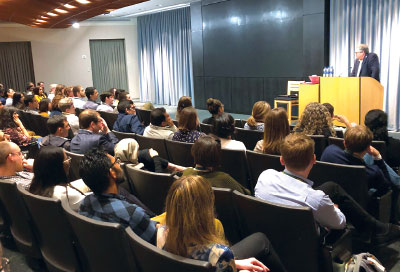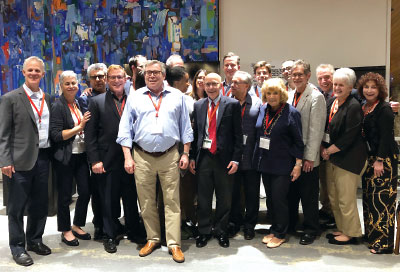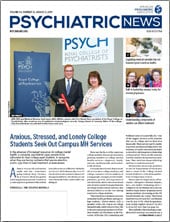Do you remember how you spent a particular weekend in 1993 or 1985? For many alumni of the Chief Residents Leadership Conference (CRLC), the answer is a resounding, “Yes.”
Founded in 1972 as the Tarrytown Leadership Conference—given the conference location in Tarrytown, N.Y.—CRLC garners praise year after year from the chief residents who attend, according to APA President Bruce Schwartz, M.D., who is also a professor, deputy chair, and clinical director of psychiatry and behavioral sciences at Montefiore Medical Center and the Albert Einstein College of Medicine.
Schwartz, who attended the seminar as a chief resident in 1978, called it an “unforgettable, life-changing experience.” He has continued his involvement in the program for many years, first as a faculty member and as the CRLC program director for the past decade.
The most recent conference, which took place the weekend of May 31 in Armonk, N.Y., marked CRLC’s 47th anniversary. The event relies on immersive, small-group exercises to build residents’ leadership skills, enhance their self-awareness, and develop their emotional intelligence. This year nearly 20 faculty members moderated sessions with chief residents representing 48 programs from across the United States and Canada.
APA Medical Director Saul Levin, M.D., M.P.A., who was among the faculty facilitating the conference, remarked, “It was impressive to see the leadership qualities that the chief residents developed during the Tarrytown experience alongside the faculty and to witness their growth toward the conclusion of the meeting.”
Amanie Salem, M.D., co-chief resident at St. Louis University, said she didn’t know what to expect when she arrived at the CRLC, but had she had any concrete expectations, “I think they would have been surpassed.”
In two and a half days she discovered her potential for good leadership. “I reflect fondly and frequently on my experience at the conference, and others have already noticed improvements in my leadership skills. Given how much the conference has impacted me, I hope there will be a way I can impact it in the future,” she said.
Julia Rutenberg, M.D., co-chief resident in the Department of Psychiatry and Behavioral Sciences at Montefiore Medical Center, called the conference “a truly transformative experience—one that will stay with me for years to come.”
Rutenberg pointed out that conferences that employ experiential learning are rare. “I left the conference with more confidence in my ability to manage conflict and intervene in a challenging situation.”
April Malikowski, M.D., another attendee, commented that CRLC stood out for its unique approach to learning and called it an “insightful and meaningful experience unlike other conferences.” Malikowski, also a co-chief resident at Montefiore, added, “It gave me the opportunity to better understand my own leadership style and the styles of others.”
Other CRLC alumni who have since advanced to supervisory positions in administrative psychiatry credit the conference with honing their leadership skills over the years.
Rahn Bailey, M.D., the minority/underrepresented trustee on APA’s Board of Trustees, told Psychiatric News that he clearly remembers attending the CRLC during the summer of 1993 when he was a chief resident at the University of Texas Health Science Center at Houston. Now an assistant dean for education at Charles R. Drew University of Medicine and Science and chief medical officer at Kedren Acute Psychiatric Hospital and Community Mental Health Program, Bailey said he has shared much of what he learned at CRLC with the residents he has supervised since.
The weekend he attended the conference, Bailey learned a particularly valuable lesson that has helped him throughout his career: “I discovered that as a leader, you must have the emotional resolve to realize that every problem won’t always result in the perfect solution.” For example, he learned an administrator or leader can’t fix every problem or please everyone on both sides of a conflict. He compromised by accepting “small losses,” which were preferable to the original problems.
CRLC also taught Bailey that there is no one-size-fits-all approach to motivating peers; each resident is unique; and to elicit maximum potential, one must “be a great listener.”
César A. Alfonso, M.D., also benefited from his weekend at CRLC when he attended in 1990 as a chief resident. “I fondly remember my group activities’ facilitators, Nalini Juthani, M.D., and Herman von Praag, M.D., Ph.D.,” he told Psychiatric News. “What was most useful to this day was advice on the importance of wisely choosing mentors. Mentors must not only be expert clinicians and/or academics but also have an ego-supportive pedagogical approach. They ought to be role models of mental health and relate at all times with equanimity and professionalism.” Alfonso is now an associate clinical professor of psychiatry at Columbia University Medical Center.
CRLC faculty facilitator David Lowenthal, M.D., an associate clinical professor of psychiatry at Columbia University, observed that despite the conference’s brevity, the residents made great strides during the experience.
“When [Dr. Schwartz] asked me to join the faculty, remembering my own experience at the Tarrytown conference years ago, I jumped at the opportunity,” Lowenthal told Psychiatric News. “Indeed, my expectations have been exceeded. I view it as a privilege to help facilitate this intense, explorative journey with the chief residents. It feels as if one can actually see the residents grow and mature before one’s eyes during the latter part of the conference. And from the point of view of the faculty, it is an immensely rewarding experience.”
Talking to Psychiatric News after the conference, Malikowski confirmed the CRLC’s lasting impact, saying, “It is an experience that promotes continued reflection past the weekend itself, and I feel better prepared for my chief resident year.” ■
More information about the conference can be found in a paper co-written by Schwartz, “The Tarrytown Chief Residents Leadership Conference: A Long-Term Follow-Up.” It is posted
here.


